16 july 2014

Using public relations efforts to build public support for military action is not a new idea. But spending money on tweets to shape global perceptions may be the next frontier for such efforts.
Hayes Brown, Editor at ThinkProgress, posted this screenshot of a promoted tweet from the official Twitter account of the Prime Minister of Israel, seeking to build support for an escalation of Israeli military operations in Gaza.
Hayes Brown, Editor at ThinkProgress, posted this screenshot of a promoted tweet from the official Twitter account of the Prime Minister of Israel, seeking to build support for an escalation of Israeli military operations in Gaza.
|
|
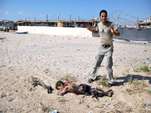
"The kids were playing football on the beach. They were all ... under the age of 15," said Ahmed Abu Hassera
Four Palestinian children were killed and one was critically wounded on a Gaza beach on Wednesday by a shell fired by an Israeli naval gunboat, a Palestinian health official said. Asked about the incident, an Israeli military spokesman in Tel Aviv said he was checking the report. "The kids were playing football on the beach. They were all ... under the age of 15," said Ahmed Abu Hassera, 22. |
"When the first shell hit the land, they ran away but another shell hit them all," said Abu Hassera, whose shirt was stained with blood.
"It looked as if the shells were chasing them," he told Reuters.
Ashraf al-Qidra, spokesman for the Gaza Health Ministry, said four of the youngsters were killed and a fifth youth was in critical condition. "This is a cowardly crime," he said.
The Gaza beach area has been shelled frequently since Israel began its offensive in the enclave on July 8 following a surge in Palestinian cross-border rocket strikes.
Gaza health officials said 207 Palestinians, most of them civilians, had been killed in air and naval barrages.
After this attack, Israel said it would temporarily halt fire in the Gaza Strip on Thursday for a five-hour period, citing humanitarian reasons.
The military said after contacts with U.N. officials Israel has decided that "between 1000 (0700 GMT) and 1500 (1200 GMT) the Israeli military will cease operational activity with the Gaza Strip and hold its fire".
"It looked as if the shells were chasing them," he told Reuters.
Ashraf al-Qidra, spokesman for the Gaza Health Ministry, said four of the youngsters were killed and a fifth youth was in critical condition. "This is a cowardly crime," he said.
The Gaza beach area has been shelled frequently since Israel began its offensive in the enclave on July 8 following a surge in Palestinian cross-border rocket strikes.
Gaza health officials said 207 Palestinians, most of them civilians, had been killed in air and naval barrages.
After this attack, Israel said it would temporarily halt fire in the Gaza Strip on Thursday for a five-hour period, citing humanitarian reasons.
The military said after contacts with U.N. officials Israel has decided that "between 1000 (0700 GMT) and 1500 (1200 GMT) the Israeli military will cease operational activity with the Gaza Strip and hold its fire".
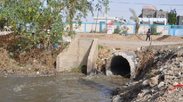
Israeli air strikes are exacerbating the already terrible situation of
Gazans access to clean water and sewage treatment, exposing tens of
thousands of people to the threat of serious diseases
Netanyahu fires Deputy Defense Minister over remarks
Following a week of Israeli airstrikes, hundreds of thousands of Gaza residents remain without running water. International aid agencies warned Tuesday that Israel's ongoing destruction of Gazan infrastructures threatens the entire coastal strip with a water crisis within days.
"Within days, the entire population of the Strip may be desperately short of water," noted Jacques de Maio, head of the International Committee of the Red Cross (ICRC) delegation in Israel and the occupied territories.
In a published statement, de Maio added that "The question is not if but when an already beleaguered population will face an acute water crisis." He further highlighted that water is becoming contaminated and sewage is overflowing, bringing a serious risk of disease.
Recent attacks have knocked water and electrical systems out of action. Palestinian officials on Saturday claimed that Israelis had targeted water wells in different areas of Gaza City.
Gaza's sewage system is also a target, with Israeli warplanes hitting sewage treatment stations in Gaza City early Saturday morning. The areas most affected include the Shati refugee camp, Tal al-Hawa, Sheikh Ejleen and most western districts of the city, according to Saed al-Din Atbash, head of the Gaza Municipality water facilities.
To make matters worse, the intensive Israeli bombing is preventing technicians from carrying out essential repairs. Following the deaths of several municipal water technicians over the past few days, Gaza’s water service provider has suspended all field operations until the safety of staff can be guaranteed.
As a result, hundreds of thousands more people will soon find there is no water when they turn on the tap.
Gaza is one of the most densely populated areas in the world, with over 4,500 people per sq. km. Over 90% of water from the Gaza aquifer is unsafe for human consumption without treatment.
In related news, AIC reports that Israeli PM Benjamin Netanyahu has fired Deputy Defense Minister, Danny Danon, over the his criticism of the government’s handling of the attacks.
Netanyahu fires Deputy Defense Minister over remarks
Following a week of Israeli airstrikes, hundreds of thousands of Gaza residents remain without running water. International aid agencies warned Tuesday that Israel's ongoing destruction of Gazan infrastructures threatens the entire coastal strip with a water crisis within days.
"Within days, the entire population of the Strip may be desperately short of water," noted Jacques de Maio, head of the International Committee of the Red Cross (ICRC) delegation in Israel and the occupied territories.
In a published statement, de Maio added that "The question is not if but when an already beleaguered population will face an acute water crisis." He further highlighted that water is becoming contaminated and sewage is overflowing, bringing a serious risk of disease.
Recent attacks have knocked water and electrical systems out of action. Palestinian officials on Saturday claimed that Israelis had targeted water wells in different areas of Gaza City.
Gaza's sewage system is also a target, with Israeli warplanes hitting sewage treatment stations in Gaza City early Saturday morning. The areas most affected include the Shati refugee camp, Tal al-Hawa, Sheikh Ejleen and most western districts of the city, according to Saed al-Din Atbash, head of the Gaza Municipality water facilities.
To make matters worse, the intensive Israeli bombing is preventing technicians from carrying out essential repairs. Following the deaths of several municipal water technicians over the past few days, Gaza’s water service provider has suspended all field operations until the safety of staff can be guaranteed.
As a result, hundreds of thousands more people will soon find there is no water when they turn on the tap.
Gaza is one of the most densely populated areas in the world, with over 4,500 people per sq. km. Over 90% of water from the Gaza aquifer is unsafe for human consumption without treatment.
In related news, AIC reports that Israeli PM Benjamin Netanyahu has fired Deputy Defense Minister, Danny Danon, over the his criticism of the government’s handling of the attacks.
|
|
International Solidarity Movement (ISM) Update 7/16/14 -- After a night of heavy shelling in the area, the day is dawning in Gaza. The clock ticks pass 08:00; past the evacuation time the Israeli military gave to el-Wafa hospital the previous evening.
After a night of heavy shelling in the area, the day is dawning in Gaza. The clock ticks pass 08:00; past the evacuation time the Israeli military gave to el-Wafa hospital the previous evening. The patients were not evacuated; there is nowhere for them to go. The entire Shajajia area where the hospital is located, with a population of around 100,000 inhabitants, has also been ordered to evacuate, as well as other areas around the Gaza Strip. For so many people to move to other areas cannot be done, and without shelter they can only rely on God and their luck. |
During the night’s bombardment, when el-Wafa hospital shook several times with explosions, suspicions were raised that the hospital had been hit. In fact, the building close by, el-Wafa Elderly Nursing Home was shelled by the Israeli military.
The upper part of the Nursing Home was peppered with machine gun fire and non-explosive grenades penetrated the concrete walls.
Lying on the floor lay the used grenades, business cards from the world’s “most moral” army.
The news that gradually circulates tells the story of a violent night in Gaza, with Israeli air strikes across the Strip. The number of deaths has now risen to over 200, higher than the death toll of the last war two years ago. From a window in el-Wafa hospital, the characteristic clouds of smoke, sand, and dust rise towards the sky.
The violence will apparently continue for another day.
The upper part of the Nursing Home was peppered with machine gun fire and non-explosive grenades penetrated the concrete walls.
Lying on the floor lay the used grenades, business cards from the world’s “most moral” army.
The news that gradually circulates tells the story of a violent night in Gaza, with Israeli air strikes across the Strip. The number of deaths has now risen to over 200, higher than the death toll of the last war two years ago. From a window in el-Wafa hospital, the characteristic clouds of smoke, sand, and dust rise towards the sky.
The violence will apparently continue for another day.
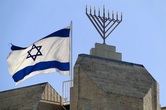
Amidst a state of fear in Israel about being kidnapped by the Palestinian resistance, Jordan's Assabeel newspaper reported on Wednesday that the Israeli occupation army announced that one of its soldiers had been missing for more than 24 hours.
According to Assabeel, the lost soldier was last seen on Tuesday at a bus station in Bir Saba'a, south of Israel, with search efforts continuous since yesterday.
The Palestinian resistance has not claimed any responsibility for the alleged kidnapping of a soldier, but the Jordanian newspaper reported that Al-Qassam Brigades did relay the news about the solder's disappearance on its official Twitter account.
According to Assabeel, the lost soldier was last seen on Tuesday at a bus station in Bir Saba'a, south of Israel, with search efforts continuous since yesterday.
The Palestinian resistance has not claimed any responsibility for the alleged kidnapping of a soldier, but the Jordanian newspaper reported that Al-Qassam Brigades did relay the news about the solder's disappearance on its official Twitter account.

Residents Zeitoun were seen walking in the streets, carrying their belongings as they tried to evacuate
Palestinians told to evacuate their homes as the Israeli offensive claims more than 200 people and injures 1500 others.
The Israeli army intensified its bombing of Gaza on Wednesday, hitting the homes of senior Hamas leaders and carrying out more than 50 airstrikes in a heavily-populated area in the northern strip. The death toll climbed to 220 people, according to Palestinian medical officials, including 47 children. On Wednesday, four children were killed by naval shelling on a beach.
More than 1,500 people have been injured. One in five of those killed so far have been children, the NGO Save the Children said on Wednesday, and the vast majority were civilians, according to the United Nations.
The army also bombed the houses of several senior Hamas leaders, including Mahmoud al-Zahar.
Some of the heaviest bombing was in and around the northern city of Beit Lahia, where the army conducted 50 airstrikes. Israel dropped leaflets and called residents the night before, warning the 100,000 inhabitants of the area to evacuate to other parts of the besieged strip.
Hamas and other groups had fired more than 60 rockets by Wednesday evening, according to the Israeli army, with no injuries or serious damage reported. One Israeli has been killed so far by more than 1,000 rockets launched from Gaza.
Israel on Wednesday morning told hundreds of thousands of residents of border areas to evacuate their neighbourhoods.
The warnings were delivered in automated phone calls, text messages and leaflets dropped from planes. Leaflets were also dropped threatening a new round of air strikes.
"We got leaflets and calls to evacuate," said Um Mohammed Rahmi, 56, who was fleeing in a donkey-drawn cart with six of her neighbours.
"We don't know where we are going. We don't know where we should go... We are just going aimlessly," she told Al Jazeera.
Hundreds of residents of the neighbourhoods of Zeitoun and Shijaiyah were also seen walking in the streets, carrying small bags with belongings.
"We don't want to leave our homes, but we do this because of the children. There are many bombings and they get terrified." said the Um Ramez, as she and her grandchildren in Zeitoun packed the trunk of a car with clothes bags, a box of food and another box of tomato.
Um Ramez told Al Jazeera they were going to her son's home in the centre of Gaza city, which was "relatively safer".
The renewed bombing came one day after a failed attempt at a cease-fire proposed by the Egyptian government. It asked Israel and Hamas to halt their fire on Tuesday morning and dispatch envoys to Cairo to discuss further terms.
The Israeli cabinet agreed, but Hamas, which said it was never consulted on the cease-fire, rejected it. Israeli jets resumed bombing the strip on Tuesday afternoon after a six-hour lull.
Ha'aretz reported on Wednesday that the cease-fire was conceived in a secret telephone call between Israeli Prime Minister Benjamin Netanyahu and Egyptian President Abdel Fattah el-Sisi.
The Egyptian plan met none of the demands Hamas has outlined for ending the conflict, beyond a vague promise to ease the blockade of Gaza "once the security situation stabilises".
Channel 2 reported that the group had proposed its own truce, offering ten years of calm in exchange for a complete lifting of the siege and the release of dozens of prisoners detained over the past month. There was no immediate response from the Israeli government.
Meanwhile, the West Bank remains quiet, despite widespread anger at the Israeli offensive. The Palestinian Authority has tried to avoid escalation, and has pressured activists not to stage protests.
Palestinian Authority President Mahmoud Abbas was in Cairo on Wednesday to meet with Sisi and discuss a cease-fire. But he has largely stayed quiet about the war, and his silence has cost him support among Palestinians.
A small group did hold a peaceful rally outside of Ofer prison near Ramallah, which was quickly broken up by Israeli forces, who fired tear gas and foul-smelling "skunk water" to disperse the demonstrators.
"The effect is very clear, there's been an increase in popular support for Hamas, and a decline for the Palestinian Authority and [Abbas]," said Ghassan Khatib, a former spokesman for the government.
"People here in the West Bank of course support resistance, and when they put the PA in comparison, it's playing against their popularity."
Palestinians told to evacuate their homes as the Israeli offensive claims more than 200 people and injures 1500 others.
The Israeli army intensified its bombing of Gaza on Wednesday, hitting the homes of senior Hamas leaders and carrying out more than 50 airstrikes in a heavily-populated area in the northern strip. The death toll climbed to 220 people, according to Palestinian medical officials, including 47 children. On Wednesday, four children were killed by naval shelling on a beach.
More than 1,500 people have been injured. One in five of those killed so far have been children, the NGO Save the Children said on Wednesday, and the vast majority were civilians, according to the United Nations.
The army also bombed the houses of several senior Hamas leaders, including Mahmoud al-Zahar.
Some of the heaviest bombing was in and around the northern city of Beit Lahia, where the army conducted 50 airstrikes. Israel dropped leaflets and called residents the night before, warning the 100,000 inhabitants of the area to evacuate to other parts of the besieged strip.
Hamas and other groups had fired more than 60 rockets by Wednesday evening, according to the Israeli army, with no injuries or serious damage reported. One Israeli has been killed so far by more than 1,000 rockets launched from Gaza.
Israel on Wednesday morning told hundreds of thousands of residents of border areas to evacuate their neighbourhoods.
The warnings were delivered in automated phone calls, text messages and leaflets dropped from planes. Leaflets were also dropped threatening a new round of air strikes.
"We got leaflets and calls to evacuate," said Um Mohammed Rahmi, 56, who was fleeing in a donkey-drawn cart with six of her neighbours.
"We don't know where we are going. We don't know where we should go... We are just going aimlessly," she told Al Jazeera.
Hundreds of residents of the neighbourhoods of Zeitoun and Shijaiyah were also seen walking in the streets, carrying small bags with belongings.
"We don't want to leave our homes, but we do this because of the children. There are many bombings and they get terrified." said the Um Ramez, as she and her grandchildren in Zeitoun packed the trunk of a car with clothes bags, a box of food and another box of tomato.
Um Ramez told Al Jazeera they were going to her son's home in the centre of Gaza city, which was "relatively safer".
The renewed bombing came one day after a failed attempt at a cease-fire proposed by the Egyptian government. It asked Israel and Hamas to halt their fire on Tuesday morning and dispatch envoys to Cairo to discuss further terms.
The Israeli cabinet agreed, but Hamas, which said it was never consulted on the cease-fire, rejected it. Israeli jets resumed bombing the strip on Tuesday afternoon after a six-hour lull.
Ha'aretz reported on Wednesday that the cease-fire was conceived in a secret telephone call between Israeli Prime Minister Benjamin Netanyahu and Egyptian President Abdel Fattah el-Sisi.
The Egyptian plan met none of the demands Hamas has outlined for ending the conflict, beyond a vague promise to ease the blockade of Gaza "once the security situation stabilises".
Channel 2 reported that the group had proposed its own truce, offering ten years of calm in exchange for a complete lifting of the siege and the release of dozens of prisoners detained over the past month. There was no immediate response from the Israeli government.
Meanwhile, the West Bank remains quiet, despite widespread anger at the Israeli offensive. The Palestinian Authority has tried to avoid escalation, and has pressured activists not to stage protests.
Palestinian Authority President Mahmoud Abbas was in Cairo on Wednesday to meet with Sisi and discuss a cease-fire. But he has largely stayed quiet about the war, and his silence has cost him support among Palestinians.
A small group did hold a peaceful rally outside of Ofer prison near Ramallah, which was quickly broken up by Israeli forces, who fired tear gas and foul-smelling "skunk water" to disperse the demonstrators.
"The effect is very clear, there's been an increase in popular support for Hamas, and a decline for the Palestinian Authority and [Abbas]," said Ghassan Khatib, a former spokesman for the government.
"People here in the West Bank of course support resistance, and when they put the PA in comparison, it's playing against their popularity."

She is young. She is pretty. She is a university graduate and a computer engineer. She is also an Israeli Parliamentarian - and the reason why I am on the brink of burning my Israeli passport. Because behind that wide-eyed innocent face lurks the Angel of Death.
Ayelet Shaked represents the far-right Jewish Home party in the Knesset. This means she is well to the right of Benyamin Netanyahu, just in case you thought such a thing was not possible.
On Monday she quoted this on her Facebook page: “Behind every terrorist stand dozens of men and women, without whom he could not engage in terrorism. They are all enemy combatants, and their blood shall be on all their heads. Now this also includes the mothers of the martyrs, who send them to hell with flowers and kisses. They should follow their sons, nothing would be more just. They should go, as should the physical homes in which they raised the snakes. Otherwise, more little snakes will be raised there.”
A week earlier, just before 17-year-old Mohammed Abu Khudair was snatched and burned alive, Shaked wrote: “This is not a war against terror, and not a war against extremists, and not even a war against the Palestinian Authority. The reality is that this is a war between two people. Who is the enemy? The Palestinian people. Why? Ask them, they started it.”
So even before the boy died horribly she declared him to be the enemy, and afterwards, without any apparent hint of guilt or remorse, she was calling for the deaths of innocent women and their unborn babies.
She made me think about my mother’s sister Klara and her three small children who were living in Krakow in 1939 when the Germans invaded. They decided that the Jews – all Jews – were the enemy and had to be eliminated, not least the women and the little snakes they were raising. “Why? Ask them – they started it”, as the Nazis would say if asked.
I never met Klara or her children who had perished by 1942. I did meet my uncle Romek, who survived by working in Oskar Schindler's factory, and his wife Yetti who survived because she spoke good German and was able to pretend she was a fine German woman who had kicked out her Polish Jewish husband, as she smiled prettily at every Nazi she came across.
Ayelet Shaked represents the far-right Jewish Home party in the Knesset. This means she is well to the right of Benyamin Netanyahu, just in case you thought such a thing was not possible.
On Monday she quoted this on her Facebook page: “Behind every terrorist stand dozens of men and women, without whom he could not engage in terrorism. They are all enemy combatants, and their blood shall be on all their heads. Now this also includes the mothers of the martyrs, who send them to hell with flowers and kisses. They should follow their sons, nothing would be more just. They should go, as should the physical homes in which they raised the snakes. Otherwise, more little snakes will be raised there.”
A week earlier, just before 17-year-old Mohammed Abu Khudair was snatched and burned alive, Shaked wrote: “This is not a war against terror, and not a war against extremists, and not even a war against the Palestinian Authority. The reality is that this is a war between two people. Who is the enemy? The Palestinian people. Why? Ask them, they started it.”
So even before the boy died horribly she declared him to be the enemy, and afterwards, without any apparent hint of guilt or remorse, she was calling for the deaths of innocent women and their unborn babies.
She made me think about my mother’s sister Klara and her three small children who were living in Krakow in 1939 when the Germans invaded. They decided that the Jews – all Jews – were the enemy and had to be eliminated, not least the women and the little snakes they were raising. “Why? Ask them – they started it”, as the Nazis would say if asked.
I never met Klara or her children who had perished by 1942. I did meet my uncle Romek, who survived by working in Oskar Schindler's factory, and his wife Yetti who survived because she spoke good German and was able to pretend she was a fine German woman who had kicked out her Polish Jewish husband, as she smiled prettily at every Nazi she came across.
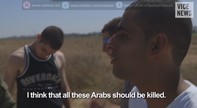
In their latest dispatch, Vice News interviewed some Israeli soldier standing close to watch the Iron Dome, while they were smoking their shisha (hookah).
Danny Gold from Vice News asked them about their opinion in the recent war on Gaza.
Personally, the answers were not surprising, but repeatedly disturbing.
When asked, the first soldier went on describing his feelings and said:
“I think that all these Arabs should be killed”.
But he did not stop there. He continued:
Danny Gold from Vice News asked them about their opinion in the recent war on Gaza.
Personally, the answers were not surprising, but repeatedly disturbing.
When asked, the first soldier went on describing his feelings and said:
“I think that all these Arabs should be killed”.
But he did not stop there. He continued:
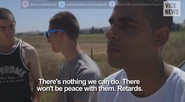
“There’s nothing we can do. There won’t be peace with them. RETARDS”.
This little monster is an example of the Israeli terrorist forces. He is like all others who will not hesitate to kill a child, women or even a handicap if and when they get a chance, because they were trained to do so, and nothing less than that.
In fact this monster is eager to join the war, as he said, maybe to fulfil his desire and thirst for blood.
This little monster is an example of the Israeli terrorist forces. He is like all others who will not hesitate to kill a child, women or even a handicap if and when they get a chance, because they were trained to do so, and nothing less than that.
In fact this monster is eager to join the war, as he said, maybe to fulfil his desire and thirst for blood.
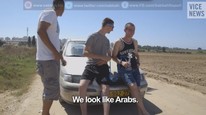
To close the scene, the other two soldiers said, “we look like Arabs”.
They were shy smoking shisha in front of the camera because they LOOK LIKE ARABS.
In short, this less than a minute part of the short interview sums up the feeling of most Israelis, not only soldiers, and reflect what they learn and how they feel about Arabs.
They are (Arabs) RETARDS, they ALL should be KILLED, and Israelis DO NOT LOOK LIKE ARABS.
I believe that Danny could have done a better job by asking them, WHY? But he didn’t.
If the occupier feels as such towards the occupied, then, how should the occupied feel towards the occupier?
They were shy smoking shisha in front of the camera because they LOOK LIKE ARABS.
In short, this less than a minute part of the short interview sums up the feeling of most Israelis, not only soldiers, and reflect what they learn and how they feel about Arabs.
They are (Arabs) RETARDS, they ALL should be KILLED, and Israelis DO NOT LOOK LIKE ARABS.
I believe that Danny could have done a better job by asking them, WHY? But he didn’t.
If the occupier feels as such towards the occupied, then, how should the occupied feel towards the occupier?
|
|

Israeli lawmaker Ayelet Shaked
A well-known Israeli politician and parliament member has branded Palestinians as terrorists, saying mothers of all Palestinians should also be killed during the ongoing Israeli assault on the besieged Gaza Strip. Ayelet Shaked of the ultra-nationalist Jewish Home party called for the slaughter of Palestinian mothers who give birth to "little snakes." "They have to die and their houses should be demolished so that they cannot bear any more terrorists," Shaked said, adding, "They are all our enemies and their blood should be on our hands. This also applies to the mothers of the dead terrorists.” The remarks are considered as a call for genocide as she declared that all Palestinians are Israel's enemies and must be killed. The development comes as many officials from various countries have slammed Israel's airstrikes on the Gaza Strip. The Turkish prime minister is the latest to condemn the offensive, accusing Israel of massacring the Palestinians. Recep Tayyip Erdogan has lashed out at Israel, saying it is committing state terrorism against the Palestinians in the region. Speaking in parliament, he also questioned the world’s silence toward Tel Aviv’s ongoing atrocities. Reacting to Shaked's remarks, the Turkish premier said Israel's policy in Gaza is no different than Hitler's mentality. |
"An Israeli woman said Palestinian mothers should be killed, too. And she's a member of the Israeli parliament. What is the difference between this mentality and Hitler's?" Erdogan asked.
The developments come as the UN agency for Palestinian refugees has recently said women and children make up a sizeable number of Palestinian fatalities caused by Israeli attacks on the besieged region.
The developments come as the UN agency for Palestinian refugees has recently said women and children make up a sizeable number of Palestinian fatalities caused by Israeli attacks on the besieged region.
|
|
They waved and shouted at the watching journalists as they passed a little collection of brightly colored beach tents, used by bathers in peacetime.
It was there that the second shell hit the beach, those firing apparently adjusting their fire to target the fleeing survivors. As it exploded, journalists standing by the terrace wall shouted: "They are only children." In the space of 40 seconds, four boys who had been playing hide and seek among the fishermen's shacks built on the wall were dead. |
They were aged between seven and 11; two were named Mohammad, one Zakaria and the youngest Ahed. All were members of the extended Bakr family.
Three others who were injured made it to the hotel: Hamad Bakr, aged 13, with shrapnel in his chest; his cousin Motasem, 11, injured in his head and legs, and Mohammad Abu Watfah, 21, who was hit by shrapnel in his stomach.
A man who had been near them reached the hotel terrace first, scrambling up a steep sandy bank. A skinny man in his 30s, he groaned and held up a T-shirt already staining red with blood where he was hit in the stomach. He fainted and was carried to a taxi waved down in the street as he grew pale and limp.
The children were brought up next. Pulling up the T-shirt of the first boy, journalists administering first aid found a shrapnel hole, small and round as a pencil head, where he had been hit in the chest. Another boy, a brother or cousin, who was uninjured, slumped by the wall, weeping.
The injured boy cried in pain as the journalists cleaned and dressed the wound, wrapping a field dressing around his chest. He winced in pain, clearly embarrassed too as a colleague checked his shorts to look for unseen femoral bleeding. A waiter grabbed a table cloth to use as a stretcher, but a photographer took the boy in his arms to carry him to the ambulance.
The Israeli military said it was looking into the incident but claimed that preliminary inquiries suggested that no naval gunfire, originally believed responsible, had occurred at the time of the incident.
At the Shifa hospital later that afternoon Hamad Bakr was concious and waiting for surgery to remove the shrapnel from his chest and drain fluid from his chest cavity.
"My father has a fishing boat there. We were playing hide and seek when we were hit. I didn't hear the first one which killed one of us but I heard the second as we were running along the beach. That one killed three more."
His mother Taghrid, aged 35, came into the room. "Why did you go out of the door?" she demanded of Hamad.
She adds: "His brother Younis," who was with Hamad, while he was being treated, "is so scared that he is shaking."
Suddenly angry and grief stricken all at once, she said: "They killed my nephew. Who does that? Who fires on children?"
As the reporters left Mohammad Abu Watfah was wheeled out of a lift after surgery to remove the shrapnel in his stomach, another victim of a war that does not seem to want to end.
The Islamist group Hamas, which controls Gaza, formally rejected Egypt's ceasefire proposal on Wednesday that had been accepted by Israel to end the nine-day-old conflict that has left at least 213 Palestinians and one Israeli dead. In a text message to the Associated Press, senior Hamas figure Sami Abu Zuhri said: "We informed Cairo today officially that we don't accept the proposal they made."
He added that Hamas felt "alone in the field" with little support from the Arab world and called on Palestinian President Mahmoud Abbas, of the rival Fatah faction in the West Bank, to support Hamas' refusal of the ceasefire deal.
Diplomatic sources told the Guardian that they did not believe that a serious new ceasefire proposal was likely to emerge for several days and, even then, securing a deal looked very difficult.
Hamas's rejection came as an Israeli official said the Israeli defence minister had asked prime minister Binyamin Netanyahu's security cabinet to authorise the mobilisation of another 8,000 reserve troops. The military has said that about 30,000 reservists have been called up since the Israeli offensive last week
Israeli experts have been predicting in recent days that any ground attack, which Israel has threatened, may involve overland raids in the Gaza Strip to destroy command bunkers and tunnels that have allowed the outgunned Palestinians to withstand air and naval barrages and keep the rockets flying. Hamas continued to fire dozens of rockets into Israelon Wednesday yesterday.
Hamas views a significant easing of the Israeli blockade as key to its survival, but does not believe Egypt's current rulers – who deposed a Hamas-friendly government in Cairo last year – can be fair brokers.
The Egyptian proposal called for a halt in hostilities by Tuesday night to be followed by talks on the terms of a longer-term cease-fire, including easing Gaza's seven-year-old border blockade by Israel and Egypt.
Israeli air raids on Gaza on Wednesday saw the targeting of 30 houses, including those of senior Hamas leaders, most notably Mahmoud Zahar, Hamas's former foreign minister.
Alongside the air strikes, Israel told tens of thousands of residents of the northern town of Beit Lahiya and the Zeitoun and Shujai'iya neighbourhoods of Gaza City–all near the border with Israel – to evacuate their homes by 8am. The warnings were delivered in automated phone calls, text messages and leaflets dropped from planes.
The Israeli military said in its message that large numbers of rockets were being launched from these areas and that Israel planned to bomb these locations.
"Whoever disregards these instructions and fails to evacuate immediately endangers their own lives, as well as those of their families," the message said.
As relatives gathered not far from the Al Deira hotel to bury the four dead boys, barely 90 minutes after the attack on the beach, the boys' uncle, Abdel Kareem Baker, 41, told journalists: "It's a cold blooded massacre," he said. "It's a shame they didn't identify them as kids with all of the advanced technology they claim they're using."
Three others who were injured made it to the hotel: Hamad Bakr, aged 13, with shrapnel in his chest; his cousin Motasem, 11, injured in his head and legs, and Mohammad Abu Watfah, 21, who was hit by shrapnel in his stomach.
A man who had been near them reached the hotel terrace first, scrambling up a steep sandy bank. A skinny man in his 30s, he groaned and held up a T-shirt already staining red with blood where he was hit in the stomach. He fainted and was carried to a taxi waved down in the street as he grew pale and limp.
The children were brought up next. Pulling up the T-shirt of the first boy, journalists administering first aid found a shrapnel hole, small and round as a pencil head, where he had been hit in the chest. Another boy, a brother or cousin, who was uninjured, slumped by the wall, weeping.
The injured boy cried in pain as the journalists cleaned and dressed the wound, wrapping a field dressing around his chest. He winced in pain, clearly embarrassed too as a colleague checked his shorts to look for unseen femoral bleeding. A waiter grabbed a table cloth to use as a stretcher, but a photographer took the boy in his arms to carry him to the ambulance.
The Israeli military said it was looking into the incident but claimed that preliminary inquiries suggested that no naval gunfire, originally believed responsible, had occurred at the time of the incident.
At the Shifa hospital later that afternoon Hamad Bakr was concious and waiting for surgery to remove the shrapnel from his chest and drain fluid from his chest cavity.
"My father has a fishing boat there. We were playing hide and seek when we were hit. I didn't hear the first one which killed one of us but I heard the second as we were running along the beach. That one killed three more."
His mother Taghrid, aged 35, came into the room. "Why did you go out of the door?" she demanded of Hamad.
She adds: "His brother Younis," who was with Hamad, while he was being treated, "is so scared that he is shaking."
Suddenly angry and grief stricken all at once, she said: "They killed my nephew. Who does that? Who fires on children?"
As the reporters left Mohammad Abu Watfah was wheeled out of a lift after surgery to remove the shrapnel in his stomach, another victim of a war that does not seem to want to end.
The Islamist group Hamas, which controls Gaza, formally rejected Egypt's ceasefire proposal on Wednesday that had been accepted by Israel to end the nine-day-old conflict that has left at least 213 Palestinians and one Israeli dead. In a text message to the Associated Press, senior Hamas figure Sami Abu Zuhri said: "We informed Cairo today officially that we don't accept the proposal they made."
He added that Hamas felt "alone in the field" with little support from the Arab world and called on Palestinian President Mahmoud Abbas, of the rival Fatah faction in the West Bank, to support Hamas' refusal of the ceasefire deal.
Diplomatic sources told the Guardian that they did not believe that a serious new ceasefire proposal was likely to emerge for several days and, even then, securing a deal looked very difficult.
Hamas's rejection came as an Israeli official said the Israeli defence minister had asked prime minister Binyamin Netanyahu's security cabinet to authorise the mobilisation of another 8,000 reserve troops. The military has said that about 30,000 reservists have been called up since the Israeli offensive last week
Israeli experts have been predicting in recent days that any ground attack, which Israel has threatened, may involve overland raids in the Gaza Strip to destroy command bunkers and tunnels that have allowed the outgunned Palestinians to withstand air and naval barrages and keep the rockets flying. Hamas continued to fire dozens of rockets into Israelon Wednesday yesterday.
Hamas views a significant easing of the Israeli blockade as key to its survival, but does not believe Egypt's current rulers – who deposed a Hamas-friendly government in Cairo last year – can be fair brokers.
The Egyptian proposal called for a halt in hostilities by Tuesday night to be followed by talks on the terms of a longer-term cease-fire, including easing Gaza's seven-year-old border blockade by Israel and Egypt.
Israeli air raids on Gaza on Wednesday saw the targeting of 30 houses, including those of senior Hamas leaders, most notably Mahmoud Zahar, Hamas's former foreign minister.
Alongside the air strikes, Israel told tens of thousands of residents of the northern town of Beit Lahiya and the Zeitoun and Shujai'iya neighbourhoods of Gaza City–all near the border with Israel – to evacuate their homes by 8am. The warnings were delivered in automated phone calls, text messages and leaflets dropped from planes.
The Israeli military said in its message that large numbers of rockets were being launched from these areas and that Israel planned to bomb these locations.
"Whoever disregards these instructions and fails to evacuate immediately endangers their own lives, as well as those of their families," the message said.
As relatives gathered not far from the Al Deira hotel to bury the four dead boys, barely 90 minutes after the attack on the beach, the boys' uncle, Abdel Kareem Baker, 41, told journalists: "It's a cold blooded massacre," he said. "It's a shame they didn't identify them as kids with all of the advanced technology they claim they're using."
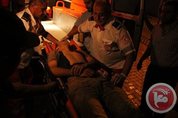
The Egyptian ambassador to Palestine said on Tuesday evening that his government is exerting major efforts to end the hostilities in Gaza, stressing that he considers Israel fully responsible for the current situation.
In an interview with Awdah TV, Wael Atiyeh said that Palestinian president Mahmoud Abbas would meet with his Egyptian counterpart Abdul-Fattah al-Sisi in Cairo, expressing his hope that the two will reach an agreement to end the Israeli aggression on Gaza.
The comments come only a day after an Egyptian-engineered ceasefire deal fell apart, after Hamas said that they had not been consulted on the terms of the deal Egypt and Israel agreed upon.
Atiyeh, however, placed the blame for the conflict squarely on Israel, stressing that exempting Israel from its responsibilities as an occupier is "a gift given for free to Israel" and that "economic burdens caused by the offensive on Gaza must be shouldered on Israel only."
Asked about the possible Egyptian initiative to stop Gaza war, the ambassador said the initiative focused on a bilateral ceasefire, a solution to the crisis with the closure of the Rafah crossing, and a return to the 2012 ceasefire between Hamas and Israel.
Atiyeh also defended his country against criticism directed toward Egypt by regional entities, stressing that the country "does its duty toward the Palestinian plight as a national priority."
"The coming days will reveal to everybody the huge effort Egypt has been exerting in order to stop the aggression on the Palestinian people," he continued.
Egypt has come under fire in recent days after Israel announced a bilateral ceasefire deal struck with their help that Hamas leaders said they had not been informed of.
After rockets continued being launched, Israel subsequently accused Hamas of breaking the ceasefire and announced an even more expanded campaign in response.
Egypt has maintained a stridently anti-Hamas tone since the military unseated the democratically-elected government of president Morsi last summer, shutting down the underground tunnels that provided a vital lifeline to the Strip's 1.7 million residents amid a crippling seven-year-long Israeli siege.
Under Morsi, Egypt helped negotiate a 2012 ceasefire that ended an Israel assault that killed around 170 Palestinians, and his government sought to work as a mediator between Israel and the Palestinians while simultaneously maintaining its warm relations with Israel.
In an interview with Awdah TV, Wael Atiyeh said that Palestinian president Mahmoud Abbas would meet with his Egyptian counterpart Abdul-Fattah al-Sisi in Cairo, expressing his hope that the two will reach an agreement to end the Israeli aggression on Gaza.
The comments come only a day after an Egyptian-engineered ceasefire deal fell apart, after Hamas said that they had not been consulted on the terms of the deal Egypt and Israel agreed upon.
Atiyeh, however, placed the blame for the conflict squarely on Israel, stressing that exempting Israel from its responsibilities as an occupier is "a gift given for free to Israel" and that "economic burdens caused by the offensive on Gaza must be shouldered on Israel only."
Asked about the possible Egyptian initiative to stop Gaza war, the ambassador said the initiative focused on a bilateral ceasefire, a solution to the crisis with the closure of the Rafah crossing, and a return to the 2012 ceasefire between Hamas and Israel.
Atiyeh also defended his country against criticism directed toward Egypt by regional entities, stressing that the country "does its duty toward the Palestinian plight as a national priority."
"The coming days will reveal to everybody the huge effort Egypt has been exerting in order to stop the aggression on the Palestinian people," he continued.
Egypt has come under fire in recent days after Israel announced a bilateral ceasefire deal struck with their help that Hamas leaders said they had not been informed of.
After rockets continued being launched, Israel subsequently accused Hamas of breaking the ceasefire and announced an even more expanded campaign in response.
Egypt has maintained a stridently anti-Hamas tone since the military unseated the democratically-elected government of president Morsi last summer, shutting down the underground tunnels that provided a vital lifeline to the Strip's 1.7 million residents amid a crippling seven-year-long Israeli siege.
Under Morsi, Egypt helped negotiate a 2012 ceasefire that ended an Israel assault that killed around 170 Palestinians, and his government sought to work as a mediator between Israel and the Palestinians while simultaneously maintaining its warm relations with Israel.
Truce violations List of names Pictures of martyrs
Days: Aug: 26 - 25 - 24 - 23 - 22 - 21 - 20 - 19 - 18 - 17 - 16 - 15 - 14 - 13 - 12 - 11 - 10 - 9 - 8 - 7 - 6 - 5 - 4 - 3 - 2 - 1
July: 31 - 30 - 29 - 28 - 27 - 26 - 25 - 24 - 23 - 22 - 21 - 20 - 19 - 18 - 17 - 16 - 15 - 14 - 13 - 12 - 11 - 10 - 9 - 8
Days: Aug: 26 - 25 - 24 - 23 - 22 - 21 - 20 - 19 - 18 - 17 - 16 - 15 - 14 - 13 - 12 - 11 - 10 - 9 - 8 - 7 - 6 - 5 - 4 - 3 - 2 - 1
July: 31 - 30 - 29 - 28 - 27 - 26 - 25 - 24 - 23 - 22 - 21 - 20 - 19 - 18 - 17 - 16 - 15 - 14 - 13 - 12 - 11 - 10 - 9 - 8

